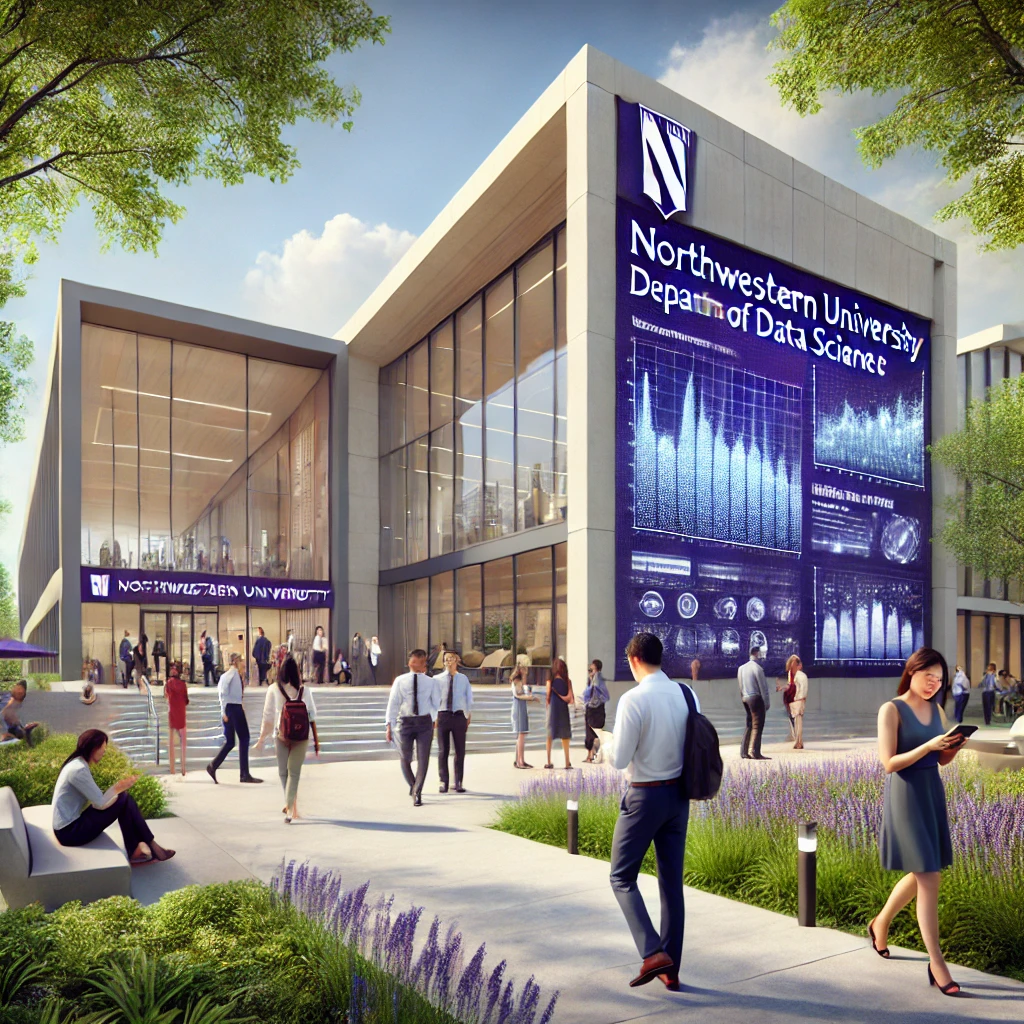Beginning
A renowned academic center for people wishing to investigate the realm of data science, statistics, and its applications in many disciplines, Northwestern University’s Department of Statistics and Data Science is known for its world-class professors, creative research, and thorough courses. Northwestern gives students a chance to acquire advanced knowledge in computational methods, statistical modeling, and data analysis. This paper will look at the department’s offerings, professors, research topics, and the significance of a Northwestern education in the data science domain.

The Development of the Department of Statistics and Data Science
The Department of Statistics at Northwestern University has expanded and changed considerably to fit the fast-changing data science scene. The department has broadened its emphasis to include a thorough data science curriculum covering statistical theory, machine learning, and computational methods. Northwestern has guaranteed its leadership in statistics education by changing with the increasing need for data-driven solutions.
Acknowledging the increasing convergence between statistics and data science, the department changed its name in 2019 to reflect both. This shift shows the wide range of their scholarly and research activity, which tackles important issues confronting sectors from healthcare to finance.
Why Select Northwestern University for Data Science and Statistics?
Varied Academic Courses
To suit a great spectrum of interests and professional aspirations, Northwestern provides several degree programs in statistics and data science. Among the most remarkable initiatives are:
- Undergraduate Program in Statistics: Students working toward an undergraduate degree in statistics at Northwestern build a solid basis in mathematical statistics, probability theory, and statistical computation. This curriculum equips students for jobs in sectors including technology, healthcare, and finance.
- Master of Science in Analytics (MSA): Emphasizing practical abilities in data management, machine learning, and data-driven decision-making, the MSA is an interdisciplinary degree combining data science with business analytics. Graduates depart ready to handle difficult data issues in many corporate industries.
- PhD Program in Statistics and Data Science: For individuals wishing to do innovative research in statistics, machine learning, and data science, the PhD program is perfect. The program aims to create future leaders in industry as well as academia.
- Flexible Master’s Programs: Northwestern also provides flexible master’s degrees catered to working professionals wanting to further their professions without affecting their professional lives. Often, these programs include teamwork with top businesses and practical tasks.
Modern Research Possibilities
Students and professors at Northwestern participate in innovative studies in many disciplines. Known for its great focus on multidisciplinary research, the department works with other universities and departments to address some of the most urgent problems of our day.
Among the research subjects:
- Machine Learning and Bayesian Models: Northwestern is a leader in advanced machine learning techniques, including Bayesian models widely employed for large data analysis and predictive modeling.
- Computational Statistics: Rising big data has made computational statistics crucial for examining complicated datasets. Northwestern’s work in this field emphasizes creating new algorithms for large-scale data processing.
- Genomic Data Science: Another important field of attention is genomic data science, which combines statistics and biology; data science is essential for comprehending genetic information and its uses in medicine.
World-Class Professors
Experts in the field who combine a lot of knowledge from both academia and industry make up the faculty of Northwestern’s Department of Statistics and Data Science. These professors are not only enthusiastic teachers but also productive researchers who greatly help the progress of statistical approaches and data science tools.
Many professors oversee respected publications and organizations, ensuring that students learn from top-tier experts at the forefront of their disciplines.
Data Science’s Influence on Contemporary Businesses
The abilities taught at Northwestern University’s Department of Statistics and Data Science are much sought after in many sectors. Large data sets are analyzed by companies with the help of data scientists and statisticians, who also help them draw relevant conclusions and make informed decisions.
1. Medicine and Healthcare
Data science is changing how patient data is examined and how medical research is done in healthcare. Data analytics gives doctors the ability to forecast disease outbreaks, maximize treatment strategies, and even create individualized medicine fit for specific patients. Leading the way in this field is Northwestern’s work in genomic data science.
2. Economics and Finance
Data science in finance helps to build predictive models for stock pricing, risk management, and investment portfolio optimization. Finance industry data scientists use sophisticated statistical models to identify patterns and trends in financial markets, hence supporting improved decision-making in banking, investing, and insurance.
3. Innovation and Technology
Tech firms are depending more and more on data scientists to examine consumer behavior, enhance product design, and optimize algorithms. The growth of artificial intelligence and machine learning has increased the range of data science in the tech sector, hence emphasizing data science and statistical analysis as essential elements of innovation.
Northwestern Network and Job Prospects
Among Northwestern University’s greatest strengths is its large alumni network and ties to business leaders. The department’s focus on industry cooperation guarantees that students acquire insightful analysis of practical uses of data science and statistics. This network offers graduates full-time employment, research partnerships, and internships to students in many fields.
While some have had great jobs in government research, finance, and healthcare, many Northwestern grads have gone on to work for leading technology companies such as Google, Microsoft, and Amazon.
READ ABOUT:Marshall Major V Headphones Sale at Macy’s: Incredible Offers on Premium Sound
Commonly Asked Questions
1. What degrees may I seek at Northwestern’s Department of Statistics and Data Science?
Including the Master of Science in Analytics and other specialty master’s degrees, Northwestern provides undergraduate, master’s, and PhD programs in statistics and data science.
2. How well known in the sector is Northwestern’s Department of Statistics and Data Science?
Renowned for its research, academic knowledge, and multidisciplinary approach to data science, the department is a leader in the field.
3. What sorts of research possibilities are there at Northwestern?
Students may work on research in several areas including machine learning, Bayesian statistics, computational statistics, and genomic data science.
4. Which sectors gain from a data science degree?
Graduates of Northwestern’s programs can work in government, education, technology, finance, and healthcare areas where data science and statistical analysis are essential.
5. How does Northwestern help graduates locate employment?
The university’s strong industry ties, career assistance, and large alumni network give students useful tools to land positions in data science and related areas.
Ending
The Department of Statistics and Data Science at Northwestern University provides a thorough, modern education that prepares students with the knowledge and tools required to succeed in the data-driven society of today. Northwestern stays a top university for people wishing to influence statistics and data science, given its emphasis on advanced research, multidisciplinary cooperation, and close relationships to industry. Northwestern offers unmatched chances to further your career in this interesting and fast-expanding sector, whether your goals are for an undergraduate degree, a professional master’s, or a PhD.

